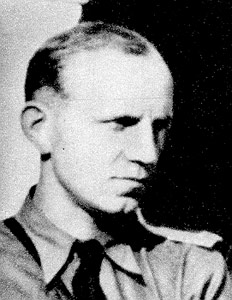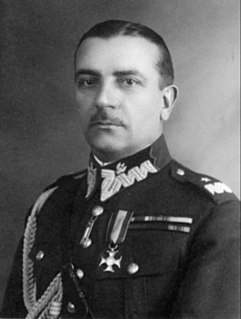 W
WStefan Adamczak was a Polish pole vaulter and chorąży in the Polish Army. He competed in the 1924 Summer Olympics.
 W
WDawid Moryc Apfelbaum, nom de guerre "Kowal" ("Blacksmith") (?-4/28/1943) was allegedly an officer in the Polish Army and a commander of the Jewish Military Union, during the Warsaw Ghetto Uprising. His very existence have been questioned by some historians, who argue that there is no credible evidence to suggest that there was a person by that name involved in the ŻZW in any capacity.
 W
WJózef Baran-Bilewski was a Polish athlete. He competed in the men's discus throw at the 1928 Summer Olympics. He was killed during World War II.
 W
WRoger Barlet was a French soldier.
 W
WKazimierz Bocheński was a Polish swimmer. He competed in the men's 4 × 200 metre freestyle relay at the 1936 Summer Olympics. He was murdered in a prisoner of war camp in World War II.
 W
WMikołaj Bołtuć was a brigadier-general of the Polish Army, commander of the IV Polish infantry Division during World War II.
Stanisław Bułak-Bałachowicz was a notable general, military commander and veteran of World War I, the Russian Civil War, the Estonian War of Independence, the Polish-Bolshevik War and the Invasion of Poland at the start of World War II.
 W
WAntoni Cejzik was a Polish athlete. He moved to Poland in 1924 as an eight-time Soviet champion in various athletics competitions and the Soviet record holder in decathlon.
 W
WJan Kazimierz Daszewski was a fighter pilot in the Polish Air Force in World War II.
 W
WTadeusz Dołęga-Mostowicz was a Polish writer, journalist and author of over a dozen popular novels. One of his best known works, which in Poland became a byword for fortuitous careerism, was The Career of Nicodemus Dyzma. Literary historians believe that the book inspired the 1971 novel Being There by Jerzy Kosiński who sparked considerable controversy in the West.
 W
WZdzisław Dziadulski was a Polish equestrian. He competed in two events at the 1924 Summer Olympics. He was killed during World War II.
 W
WWitold Józef Dzierżykraj-Morawski (1895—1944) was a Polish military commander, diplomat and a Colonel of the Polish Army.
 W
WEmilia Gierczak was a Polish soldier of the Polish Armed Forces in the East during the Second World War. After being killed in combat, several streets and organisations were subsequently named after her in Poland.
 W
WStanisław Grodzicki was a Polish fighter pilot and a Major of the Polish Air Force during World War II. He fought during The Blitz in 1941 as a night fighter pilot with No. 307 Polish Fighter Squadron, flying the Boulton Paul Defiant. From November 1940 to June 1941 he was also the commanding officer of the unit. He was awarded the Distinguished Flying Cross.
 W
WJan Grudziński was a submarine commander of the Polish Navy during World War II.
 W
WThe Defence of the Polish Post Office in Danzig (Gdańsk) was one of the first acts of World War II in Europe, as part of the September Campaign. On September 1, 1939, the Invasion of Poland was initiated by Germany when the Schleswig-Holstein battleship opened fire on the Polish-controlled harbor of Danzig, around 04:45-48 hours. Danzig paramilitaries and police, supported by Germany, immediately joined the offensive to take full control of the city, by capturing the Polish post office. Polish personnel defended the building for some 15 hours against assaults by the SS Heimwehr Danzig, local SA formations and special units of Danzig police. All but four of the defenders, who were able to escape from the building during the surrender, were sentenced to death by a German court martial as illegal combatants on October 5, 1939, and executed.
 W
WZdzisław Karol Henneberg VM, DFC, KZ***, CdeG was a Polish airman who flew with the Royal Air Force during the Battle of Britain and a flying ace of the Second World War.
 W
WEugeniusz Horbaczewski was a Polish fighter pilot, a flying ace of World War II, also known as "Dziubek". According to official lists, Horbaczewski was the third highest scoring Polish fighter ace, with 16.5 confirmed kills and one probable kill. He was awarded several decorations, among others Virtuti Militari IV class (posthumously) and V class, four times Polish Cross of Valour, Distinguished Service Order (posthumously) and Distinguished Flying Cross (twice).
 W
WIrena Morzycka-Iłłakowicz was a Polish second Lieutenant of the National Armed Forces and intelligence agent. The daughter of Bolesław Morzycki and Władysława Zakrzewska and the sister of Jerzy, she was also a polyglot who spoke seven languages: Polish, French, English, Persian, Finnish, German and Russian.
 W
WJózef Jaworski was a Polish middle-distance runner. He competed in the men's 800 metres at the 1924 Summer Olympics. He was killed in action during World War II.
 W
WWładysław Karaś was a Polish sport shooter who competed in the 1936 Summer Olympics. In 1936 he won the bronze medal in the 50 metre rifle prone event.
 W
WAntoni Wladyslaw Kiewnarski known as “Tony” was a Polish Vickers Wellington bomber “Observer and Captain” flying from England when he was taken prisoner during the Second World War. He is notable for the part he took in the 'Great Escape' from Stalag Luft III in March 1944 and as one of the men recaptured and subsequently shot by the Gestapo.
 W
WWłodzimierz Adam Kolanowski was a Polish Vickers Wellington bomber “Observer and Captain” flying from England when he was taken prisoner during the Second World War. He is notable for the part he took in the 'Great Escape' from the Stalag Luft III prisoner of war camp in March 1944 and as one of the men recaptured and subsequently shot by the Gestapo.
 W
WAlexander Marek Kowalski was a Polish ice hockey defenceman who competed in the 1928 Winter Olympics and in the 1932 Winter Olympics.
 W
WStanisław Zygmunt "Danny" Król, known as "Danny", was a Polish Supermarine Spitfire fighter pilot flying from England when he was taken prisoner during the Second World War. He is notable both as a persistent escaper and for the part he played in the 'Great Escape' from Stalag Luft III in March 1944 being one of the men recaptured and shot by the Gestapo.
 W
WStanisław Kuryłłowicz was a Polish rower. He competed at the 1936 Summer Olympics in Berlin with the men's coxed four where they were eliminated in the semi-final.
 W
WJózef Rudolf Kustroń was a Brigadier General of the Polish Army in the Second Polish Republic, commandant of the 21st Mountain Infantry Division.
 W
WFlorian Marciniak was a Polish scoutmaster (harcmistrz), and the first Naczelnik of the paramilitary scouting resistance organization, the Szare Szeregi, during the Second World War.
 W
WKazimierz Władysław Mastalerz was a Polish military commander of the 18th Pomeranian Uhlan Regiment.
 W
WJerzy Mondschein was a Polish Vickers Wellington bomber Observer (navigator) flying from England when he was taken prisoner during the Second World War. He is notable for the part he took in the 'Great Escape' from Stalag Luft III in March 1944 and as one of the men recaptured and subsequently shot by the Gestapo.
 W
WKazimierz Pawluk known as “Kaz” was a Polish Vickers Wellington bomber “Observer and Captain” flying from England when he was taken prisoner during the Second World War. He is notable for the part he took in the 'Great Escape' from Stalag Luft III in March 1944 and as one of the men recaptured and subsequently shot by the Gestapo.
 W
WKonstanty Plisowski of Odrowąż was a Polish general and military commander. He was the Commander in the battle of Jazłowiec and the battle of Brześć Litewski. He was murdered on Stalin's orders in the Katyn massacre.
 W
WWładysław Raginis was a Polish military commander during the Polish Defensive War of 1939 of a small force holding the Polish fortified defense positions against a vastly larger invasion during the Battle of Wizna. Because the positions were held at great cost for three days before being annihilated with few survivors, Wizna is referred to as the Polish Thermopylae and Captain Raginis as a modern Leonidas.
 W
WBrigadier General Bolesław Jerzy Roja was an officer of the Polish Legions in World War I, a general, and a politician in the Second Polish Republic, recipient of some of the highest Polish military awards including Virtuti Militari. He opposed Józef Piłsudski and his Sanacja regime in the 1920s. After the German invasion of Poland in 1939 he was arrested and murdered by the Nazis in Sachsenhausen concentration camp.
 W
WStefan Paweł Rowecki was a Polish general, journalist and the leader of the Armia Krajowa. He was murdered by the Gestapo in prison on the personal order of Heinrich Himmler.
 W
WStanisław Jakub Skarżyński was a lieutenant colonel in the Polish Air Force and aviator famous for his transatlantic solo flight in 1933.
 W
WJózef Szanajca was a Polish architect.
 W
WWiktor Wiechaczek was a Polish soldier, who participated in the Silesian Uprisings. Born on 10 October 1879 in Ruda Śląska, Wiechaczek was a Polish patriot, living in Upper Silesia, which then belonged to Germany. In 1913 he took part in a strike in the Pawel coal mine, for which he was fired. After 1918, Wiechaczek actively participated in pro-Polish movement in Silesia, and together with Józef Trojok, he was one of leaders of the First Silesian Uprising. In 1921, he was a member of the Wawelberg Group, and for his activities, Wiechaczek was awarded the Virtuti Militari cross, number 7840.
 W
WZygmunt Aleksander Wnęk (1918–1944) was a Polish soldier and military officer. During World War II he served in the rank of 2nd Lieutenant (podporucznik) on the Western Front with the 1st Armoured Regiment of the 1st Armoured Division. Killed in action during the Battle of Falaise, he was posthumously awarded the Silver Cross of Virtuti Militari, Poland's highest military decoration.
 W
WJan Wrzosek was a Polish sports shooter. He competed in the 50 m rifle event at the 1936 Summer Olympics. He was killed in action during the September Campaign in 1939.
 W
WJanusz Rajmund Zalewski was a Polish sailor. He competed in the mixed 6 metres at the 1936 Summer Olympics. Zalewski was wounded during the Warsaw Uprising and was killed in reprisals for the revolt.
 W
WStanisław Ziffer was a Polish long-distance runner. He competed in the men's 5000 metres at the 1924 Summer Olympics. He was killed during World War II.